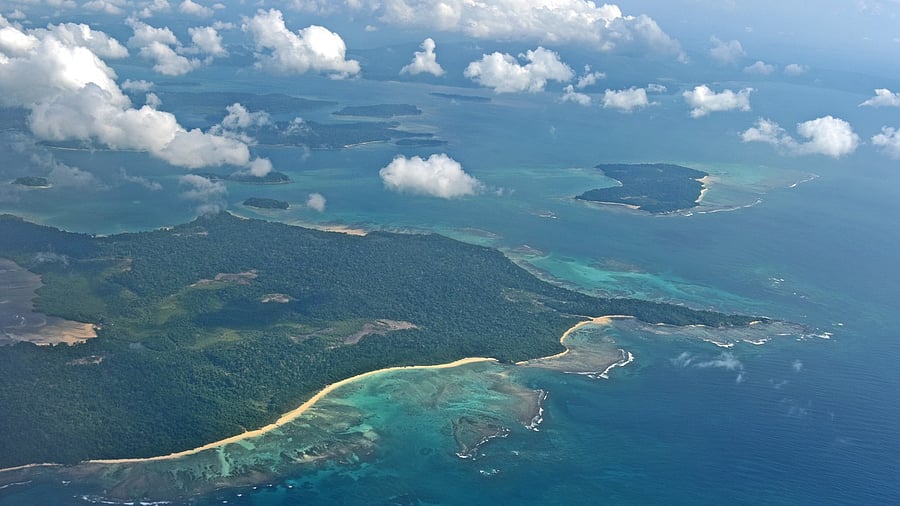
Andaman and Nicobar Islands
Credit: iStock Photo
It’s easy to get carried away by the language of development – connectivity, investment, strategic frontiers. These are strong words, full of promise and urgency. They dominate headlines and policy speeches, often used to justify large-scale change. But in all this talk, we rarely stop to ask: development for whom, and at what cost?
Having served several tenures in the Andaman and Nicobar Islands over four decades, I have seen first-hand how fragile cultures and entire ways of life can be swept aside in the name of progress. Change often comes wrapped in noble intentions but it can trample the delicate balance between nature and indigenous society.
Nearly 40 years ago, during my first posting to this remote archipelago, I had a rare and humbling view into a world largely untouched by modern life. I had the opportunity to fly the then Deputy Chair of the Planning Commission, Prof M G K Menon, to Dugong Creek in Little Andaman, a densely forested area home to the Ongé tribe. The Tribal Welfare Board had gently persuaded a few Ongé members to meet the visiting official. There were no cameras, no press, no ceremonies. Just a quiet, tentative meeting across a deep cultural divide. That encounter showed
how careful and respectful
we must be when engaging with a world so different from our own.
On another visit, a tribal woman, one of the few Ongé to become pregnant, was suffering from obstructed labour. She was unclothed, in keeping with her community’s way of life. We flew her to Port Blair for emergency care, shielding her with bed sheets, given that she was being thrust into a world utterly foreign to her. It was a fragile, reluctant meeting point between ancient life and modern medicine.
A decade later, I returned to Dugong Creek as Commanding Officer of the Coast Guard Ship, Gangadevi. We were accompanying the then Lieutenant Governor, Vakkom Purushothaman. The contrast was stark – the Ongé came out to meet us wearing Yankee T-shirts, standing beside an election poster.
It was unsettling. A community that had once lived by its ways was now forced into a system they had never chosen. They were in a story about political inclusion and modern identity, but written without their voice.
During my third tenure – as Chief of Staff at the tri-service Headquarters Andaman and Nicobar Command – we had to go farther south, to Great Nicobar Island, to find signs of indigenous life still in rhythm with the land. The Shompen, listed by the government itself as a Particularly Vulnerable Tribal Group, lived deep in the forest, largely untouched by the outside world. The Nicobarese, another distinct tribal group, lived closer to the coasts. These were not “undeveloped” communities. They were sustainable, resilient, and closely tied to the land.
Bulldozing a culture
But that fragile independence is now under serious threat. Great Nicobar is on the verge of massive change. A Rs-72,000 crore mega-project has been approved, featuring a transshipment port, international airport, military base, and township. To make room, nearly a million trees are set to be cleared. The Shompen and Nicobarese face the loss of their forests, their freedom, and their identity. While both groups are protected under the Andaman and Nicobar Protection of Aboriginal Tribes Regulation, 1956, those safeguards seem increasingly weak in the face of rushed environmental clearances and token public hearings.
The government presents this as progress – economic upliftment, strategic importance, national pride – but it could also be an irreversible break in the island’s ecology and cultural memory. This is not a sentimental longing for a lost past. Nor is it a rejection of development. It is a plea for recognition – that these tribal communities are not “backward”; they are keepers of unique knowledge, languages, practices, and values evolved over centuries. Their isolation is not ignorance – it is a form of adaptation. And their presence is not a hurdle but part of the land’s story.
We often, erroneously, treat development as a straight path, from “backwardness” to modernity. Development that erases, excludes, or silences people cannot be called progress. Real development asks hard questions, shows sensitivity, and respects what exists. We cannot bulldoze history and expect peace to follow.
Change is, of course, inevitable. But how it happens matters. Will it happen with dignity, consent, and understanding? Or with force, indifference, and loss? That choice will define us as a society. If we don’t stop to ask who gains, we may forget who loses. The world of the Ongé and the Shompen is not just theirs – it is part of our shared human story. Ignoring that doesn’t just harm them – it lessens us all.
(The writer has served as Chief of Staff at the Andaman and Nicobar
Command and Commanding Officer of Coast Guard Ship Gangadevi)